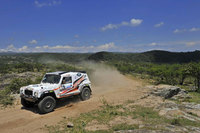Land Rover continues to power Race2Recovery dream

The Land Rover-supported Race2Recovery team continues to demonstrate an unwavering will to overcome adversity as it remains among the surviving competitors in the 2013 Dakar Rally. Race2Recovery still has one Land Rover Defender based Wildcat running in the T1 category in the most-gruelling motorsport competition in the world after 11 days and 6,000 kilometres of competitive driving in some of the most demanding terrain seen in rally-raid. A further four days remain before the event finishes in Santiago, Chile, on 20 January 2013.
After running at high speeds on rough roads and across sand dunes for nine days in the sweltering heat of Peru and Argentina, the Wildcat affectionately known as “Joy”, captained by British duo, Major Matthew O’Hare and Corporal Philip Gillespie, is still going strong now that the rally has reached Argentina.
O’Hare and Gillespie continue to realise the dream of Race2Recovery; a team made up primarily of disabled British-service personnel, who set out to prove to themselves and others what is possible once you go beyond injury and achieve the extraordinary. Gillespie lost his right leg below the knee after standing on an Improved Explosive Device (IED) on tour in Afghanistan.
Captain Tony Harris said: “In order to achieve our goal to be the first disabled team to complete the Dakar, we have to cross the finish line with at least one car. With just four days to go, but with some of the most demanding stages still to come, we are putting everything we have into helping the final car finish.
“This challenging human endeavour has stretched everyone in the team beyond what we expected, but we are proving the point that there is life beyond injury.”
Land Rover’s support of Race2Recovery includes the supply of Land Rover engines and other mechanical parts for the team’s race vehicles, pre-event driver training and Land Rover Discovery support vehicles. These capable vehicles have taken on extra responsibility after Race2Recovery’s eight-wheel support trucks retired with mechanical failures. Much of the team’s equipment is now being carried by the Discoverys.
The Land Rover Discovery support vehicles have also been used in a way unique to Race2Recovery: retired co-driver Corporal Tom Neathway’s right prosthetic leg had broken down in the heat and dust of Argentina, so he used the Discovery on-board battery to recharge it!
Race2Recovery started the 15-day trek with four Land Rover-based Wildcats. Despite the world-class underpinnings of the vehicles, the notoriously-difficult rally took its toll, with three Wildcats joining the lengthy retirements list. Wildcat “IRD”, crewed by Captain Tony Harris and Cathy Derousseaux, suffered technical difficulties en route and did not reach enough checkpoints during day one to be permitted to start the next stage. Wildcat “RatCat”, crewed by Brit Ben Gott and US Marine Staff Sargent Mark Zambon, crashed beyond repair in the desert. Wildcat “Orange Plant”, crewed by Justin Birchall and Corporal Tom Neathway, retired following a serious impact to the drivetrain. The remaining Wildcat, despite its maiden run in the rally has overcome harsh terrain, demanding altitudes and temperatures which have led to 49 bikes, 12 quads, 57 cars and 10 trucks retiring from the race.

